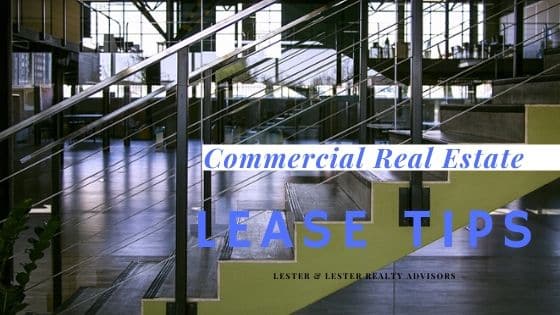These commercial real estate lease tips for tenants are brought to you by the team at Lester & Lester Realty Advisors.
The art of negotiation means making compromises. However, it’s important that some things aren’t all in your landlord’s favor. We felt this made it important to share these commercial real estate lease tips.
Here are 10 commercial real estate lease tips you need to know:
1. Have expert tenant representation
Now, you could be asking yourself: “What Is Tenant Representation And Why You Need It?” The obvious answer is having a commercial real estate tenant representation expert on your team can’t hurt. However, it’s important to know that brokers know the market, have experience and can help you get a fair deal. It also won’t cost you a thing as the broker’s fees are paid by the landlord. Therefore, this service will help you save money and avoid hassles while not costing you a thing.
2. Focus on the fine print
A lot of people really don’t want to read the fine print. Landlords and their brokers can tell you the contract is standard and act as if it’s no big deal to just sign. This practice happens more often than people would like to admit so it’s important to be aware. Contracts are often written with the landlord’s best interest in mind. The initial rental agreement is more or less a starting point for negotiation.
3. Figure out the bottom line
It’s very important to calculate all of the costs associated with any commercial real estate lease prior to signing. There are often a lot of hidden costs in a commercial lease you have to be aware of. You are most likely going to responsible for yearly increases in Common Area Maintenance (CAM), taxes, or more. Therefore, it’s important to figure out monthly payments so you can fit into your budget. It’s also important to make sure that it’s fair.
4. The early bird gets the worm
Don’t wait too long to start looking for commercial real estate lease opportunities. It’s one thing to know how to lease commercial real estate but it’s also important to when to start. The more pressed for time you are to make a decision or find a new location the harder it will be to negotiate a fair contract. When the time is on your side there is more power to negotiate. If you start early you can dig through more options.
5. Research the property history and needs
It’s important to also consider the property history and needs. The fine print won’t always mention the condition of the electricity, water heater or whatever else you may be responsible for. It’s ok to do some fact-checking and ask about the property’s history. A good property inspection can often save a tenant thousands of dollars.
6. Prioritize your wants
Make a list of your biggest wants as far as the amendments and concessions to be added to the contract. If you prioritize your wants and know what your dealbreakers are you’ll be able to better negotiate the right deal on the right property.
7. Know the local market
It is important to know what other tenants in the area are paying so you know the going rate. It’s also important to know what type of contracts they’re typically signing. This will help you prove you have a reasonable offer and requests. It’s best to take tip #1, but this is the new #1 tips if you decide to go it on your own. Make sure you do plenty of research before you negotiate and sign a commercial real estate lease.
8. Have a team
It is important to have a team of experts look at the contract before you sign. Include your team of management, finance, legal, and operations expert review and provide feedback. You never know how a fresh set of eyes or unique experiences find in the lease agreement.
9. Flexibility is your friend
It’s important to know flexibility is your friend because you never know what tomorrow may hold. Keep your lease as flexible as possible so you’re not stuck if you don’t have to be. Subletting clauses or ways to renegotiate or end your lease may save you a lot of time, money, and hassle down the road.
10. Be willing to leave the table
One of the biggest things you need to know before you sign a commercial real estate lease is that you don’t have to sign a lease if you don’t want to. Be ready to walk away from a bad lease. If your landlord is willing to be reasonable upfront than you need to walk away. You are often better off going with the second-best property on your list if the terms are a better fit for your business.
Tenant representation in Dallas and Fort Worth
We encourage you to contact us should you want more to learn more about our CRE services. Feel free to reach out to discuss your needs or how we can help at any time.
We are always glad to discuss corporate real estate with business owners considering their options. There is also no charge or obligation when it comes to having a discussion. Call us or shoot us an email today so we discuss your needs.
Learn more about David Lester on LinkedIn and make sure to also check out our Facebook page.

